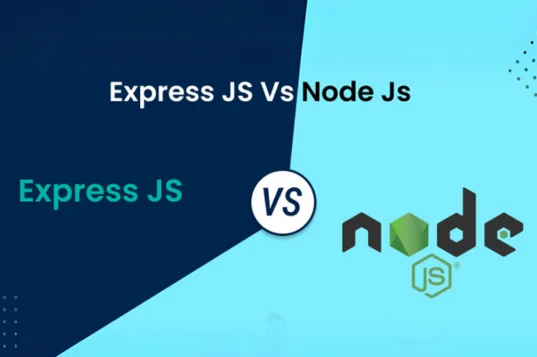Confused about whether to choose ExpressJS or NodeJS for web app development? It’s not uncommon to get stuck at this point, many struggle just like you. One is a framework whereas the other is a runtime environment. Both are perfect for developing web applications, but what makes one better than the other? Check out everything in our comparison blog- Express.js vs Node.js.
In this guide, we will discuss these key points:
1. Overview and key features of Express.js
2. Overview and key features of Node.js
3. Pros and cons of each technology
4. Real-life applications and examples of each
5. Differences between Express.js and Node.js
6. Which is the best for you?
7. FAQs
What is ExpressJS?

In 2010, IBM released this free and open-source framework. Since then, it has become a standard backend framework for building NodeJS apps and RESTful APIs.
The framework is written in JavaScript language and works under MIT license. It’s specifically designed to handle the server-side logic of a web application.
Routing user requests to the right code, processing data from forms or APIs, and generating dynamic web pages are a few things you can do with it.
Also Read: REST API vs RESTful API: Which is Good for Web App Development?
Features of ExpressJS
Middleware: It helps in tasks like authentication, error handling, parsing data, and app logging.
Routing: Its routing features help in distributing client requests to the right handles. In short, routing simplifies the way your app will respond to incoming requests.
Templating Engines: This feature lets you create dynamic content for your web pages. You can do this by creating templates in HTML languages on the server.
Pros
- Easy to use and structure code.
- Easy to integrate with databases such as MongoDB, and Redis.
- Can handle large volumes of request
- Responsive even during heavy loads, thanks to its event-driven architecture.
- Vast community for support and guidance.
Cons
- Callback issues may occur.
- Less suitable for highly customized projects.
Applications of Express.js
Using this versatile framework, you can build web apps, real-time apps, single-page, and hybrid web apps. E-commerce, enterprise apps, APIs, and multi-page applications are usually developed using Express.Js.
What is NodeJS?

It is neither a framework nor a programming language as many developers think. Instead, Node.js is a runtime environment to help you execute the code on the server side and not in a web browser.
This open-source platform is built on JavaScript language and uses a single-threaded approach. As a result, your app delivers high performance and is easy to scale.
To improve functionality, use Node.js with backend frameworks like Meteor and Express.
Features of NodeJS
Asynchronous: This feature makes the client-side server fast as it doesn’t have to wait for data.
Single-Threaded: Unlike traditional servers, it handles requests without blocking any operation.
Node Package Manager: Installing and managing Node.Js is faster due to this powerful package manager. You can also share reusable codes easily and integrate third-party frameworks or libraries.
Pros
- No data buffering since it’s asynchronous.
- Free source code as it is an open-source platform.
- Compatible with Windows, Mac, Linux, and other OS.
- Easy to learn as it is built on JavaScript.
- Good for building real-time applications.
Cons
- Unstable APIs are the challenge in NodeJS.
- Developing complex apps is difficult because of its asynchronous nature.
- Not every database supports NodeJS.
Applications of Node.js
It is good for building web servers, microservices, single-page apps, online games, and data-intensive apps. Automation and scripting are some other areas where Node.Js is commonly used.
Popular apps such as PayPal, Uber, Netflix, Linkedin, and Groupon are built on Node.Js.
Also Read: Blazor vs React: Which is the Right Framework for Front-End Development?
Express.js vs Node.js: Key Differences Every Web App Developer Must Know
Hope both the backend technologies for web app development are now clear to you. It’s time to focus on their differences and decide which one is good for your project.

Other than these differences, it is important to judge them on more important parameters. Like, you should know whether apps built on them will deliver high performance, easy to scale, or test.
So, here we go to the second round of comparing Express.js vs Node.js.
Performance: Apps built on Node.js run better due to its asynchronous feature. Other than this, multitasking and the V8 Javascript engine make your app super-fast.
On the other hand, ExpressJS also offers high performance because of its request-handling capabilities. Thus, it is suitable for web or mobile apps that receive requests more than other applications.
Testing: Whether you choose Express.js or Node.js, the primary goal is to build a flawless app. Testing comparison is thus very important.
Both are easy to test but you may face code structure issues with Node.js. For faster testing and writing test cases easily, use AI automation testing tools.
Jasmine, Mocha, and Lab and Code are a few best tools for testing Node.js apps. Supertest, Sinon, and Chai are the best libraries to work with Express apps.
Scalability: You get the flexibility to scale your web apps with a growing workload whether you choose express or node.js. Thanks to their event-driven architecture and non-blocking features.
So, which is the Best?
Considering the features, benefits, and comparison factors, you might want to know if Express.js is better than Node.js or vice versa.
The answer depends on what you want to build and achieve. If a streaming web app like Netflix is your project, choose Node.js.
And if your project is an application for sharing large amounts of data, choose Experss.js.
Conclusion
In web app development, you will come across various frameworks and technologies. However, making a choice won’t be easy. The same goes with Experss.js and Node.js.
Both are perfect for backend development, flexible, scalable, and easy to learn. But the final choice depends on you.
How do you see each technology and what are the end goals you want to meet with them?







